Job Search Assistant

Employment Attorney - Interim Assignments - New York City
Peerpoint • New York, NY 10261 • Posted 4 days ago via LinkedIn
Boost your interview chances in seconds
Tailored resume, cover letter, and cheat sheet
In-person • Full-time • $95.00-$210.00/hr • Temporary • Contract • Senior Level
Job highlights.
Using AI ⚡ to summarize the original job post
Peerpoint is seeking lawyers with a minimum of 5 years' top-tier post-qualification experience in employment law for interim assignments. Ideal candidates will have experience in general employment law advice, as well as exposure to disputes and litigation in the employment context. This role offers the opportunity to work on the best projects, clients, and resources, with the support of A&O Shearman's global platform.
Responsibilities
- Provide general employment law advice
- Handle disputes and litigation in the employment context
- Work on assignments of typically six months or more
- Utilize Peerpoint's global platform for self-directed consultant lawyers
- Access the best work, clients, resources, and bespoke support
Qualifications
- Minimum of five years' post-qualification experience at a law firm ranked as top tier for employment law
- Admission to the New York Bar
- Research on the personal and financial factors of a legal consulting career
- Comfortable with the differences between permanent employment and legal consulting
- Commitment to building a positive and productive relationship with Peerpoint
- Consultant mindset with a highly professional, flexible, and adaptable outlook
- Ability to make effective transitions into new environments
- Excellent communication and interpersonal skills
- Resilient, autonomous, and highly credible with exemplary commercial/business acumen and client service ethic
- Proven project management skills
- In-house legal experience at a leading financial services institution or corporate
Full Job Description
Progressive legal careers
Peerpoint is A&O Shearman's global platform for self-directed consultant lawyers who want to access the best work, clients, resources and bespoke support, whilst undertaking assignments of typically six months or more, either within A&O Shearman practice groups or directly with clients. To find out more, please visit www.peerpoint.com.
We are currently looking for lawyers with a minimum of 8 years' top-tier post-qualification experience in employment law. Ideally lawyers who have experience in the provision of general employment law advice, as well as some exposure to disputes and litigation in the employment context.
Our criteria
Successful applicants will:
- have a minimum of eight years' post-qualification experience at a law firm ranked as top tier for employment law;
- preferably have in-house legal experience at a leading financial services institution or corporate (directly or as a secondee);
- be admitted to the New York Bar - if you intend to work remotely from a location outside those jurisdictions, candidate may be required to have an active bar license in the state where they reside and where legal work will be done;
- have a desire to take ownership of their career and be responsible for their own professional development and network, proactively making use of any support and resources available;
- have researched the personal and financial factors that you need to consider when commencing a career as a legal consultant and be comfortable with the ways in which it differs from permanent employment;
- be committed to building a positive and productive relationship with Peerpoint, including having a transparent, open and responsive style of communication;
- have a consultant mindset, including a highly professional, flexible and adaptable outlook and approach;
- have an ability to make effective transitions into new environments and be motivated to deliver an excellent standard of service to each client;
- have excellent communication and interpersonal skills, with an ability to professionally deal with stakeholders at all levels, building strong relationships internally and externally;
- be resilient, autonomous and highly credible, with exemplary commercial/business acumen and client service ethic;
- have proven project management skills; and
What makes consulting with Peerpoint different?
A career with Peerpoint is unmatched in the market. Over the last decade, we’ve helped lead the transformation of legal consulting as a truly credible option alongside private practice and in-house legal careers. We also have one of the most supportive offerings around, all with the full backing of A&O Shearman.
Empowering your development – you’ll be fully supported by our experienced team and will have access to A&O Shearman’s training, development and networking events, including opportunities to grow your skillset with A&O Shearman’s Advanced Delivery & Solutions businesses. On assignment, you’ll have access to an A&O Shearman partner and professional support lawyers as well as extensive knowledge resources.
Variety you control – steer your legal career in whichever direction you choose. Whether you’re looking for more control, choice or variety, as a Peerpoint consultant you’ll have the pick of the best challenges from across a range of sectors.
Let your priorities lead – it’s never been more important to find the right balance. That could mean more flexibility over the time you spend between your personal and professional life, whether that's to pursue a passion, spend time with family or take breaks to travel the world.
Futureproof your career – if you need coaching or mentoring, our team can guide you on the range of diverse paths to help you grow your experience. By understanding your needs and supporting you at every step, we’ll help you succeed so you can flourish both today and tomorrow.
Compensation
The salary range for this position is $95 to $210 per hour. Peerpoint lawyers are typically paid an hourly or day rate. The actual rate offered will depend on the overall qualifications of the individual applicant, the details of the assignment, and other job-related factors permitted by law. Peerpoint attorneys also get access to additional benefits, including a healthcare plan, legal resources and trainings programs, mental wellbeing programs, and reimbursement of professional fees. More specific salary information is available upon request.
Please note that we will not be using agencies for this role and we will not respond to unsolicited CVs.
Search for other jobs like this one:
Search for popular related roles:
Search nearby locations hiring for this role:
Use AI to boost your interview chances for free ✨
- We'll create you a professional resume
- We'll customize your resume for this job to maximize your interview odds
- If you get the interview, we'll provide free interview support to help you get the job
Attorney – Peerpoint Interim Assignments - Intellectual Property – US Job at Allen & Overy
Allen & Overy Washington, DC
Job Information
- Date Posted 2024-10-27
- Location Washington, DC
- Job Title Attorney – Peerpoint Interim Assignments - Intellectual Property – US
- Gender Both
- have a minimum of three years' experience at a law firm ranked as top tier for Intellectual Property;
- have a technical or STEM degree (Bachelor’s or higher required, PhD or Masters preferred) in addition to a law degree;
- have a strong technical knowledge and critical thinking skill set of the legal framework surrounding the Intellectual Property systems in the United States;
- ideally have prior patent prosecution experience, as well as experience in Inter partes review (IPR) proceedings;
- be admitted to the Washington DC bar; if intend to work remotely from a location outside this jurisdiction, candidate may be required to have an active bar license in the state where they reside and where legal work will be done;
- be registered with the patent bar;
- have a commitment to building a career through interim assignments and be motivated to operate at a high level whilst working in this way;
- have a ‘consultant mindset’, including a flexible and adaptable outlook and approach;
- have proven project management skills;
- have excellent communication and interpersonal skills, with an ability to interface at all levels, building strong relationships internally and externally;
- be resilient, autonomous and highly credible, with exemplary commercial/business acumen, client service ethic and commitment; and
- have excellent academic credentials.
- Benefit from the resources from an elite international law firm.
- Earn generous compensation, including benefits such healthcare, access to Allen and Overy’s resources and training opportunities, and reimbursement of professional fees.
- Receive objective and individualized career advice and support.
Related Jobs
Lpn (licensed practical nurse) for home care at nest & care / 7 days ago.
Nest & Care Silver Spring, MD 20901
Assistant Service Manager (Automotive) at Pep Boys / 6 days ago
Pep Boys Mesa, AZ
Math Teacher at Granville County Schools / 7 days ago
Granville County Schools Creedmoor, NC 27522
Sales Executive at PrimePay, LLC / 8 days ago
PrimePay, LLC Remote
Echocardiogram Technician (Echo Tech) - Gulf Coast Region AL/MS at Sage Health / 7 days ago
Sage Health Mobile, AL
Massage Therapist at SportsCare Center / 30+ days ago
SportsCare Center Huntington Beach, CA 92647

Listen to a selection from the audiobook
or click here to download

"Martin Cruz Smith knows his Russia. Every page reeks of Moscow: dirty snow, the stink of cigarette and vodka fumes, the cynicism and tasteless opulence of the mafia, the all-pervasive corruption."
- The Economist
"As always, Smith elevates a police procedural story to a taste of Russia, a glass of vodka poured quivering to the brim."
- Jennifer Kay, Associated Press
The Siberian Dilemma
Coming November 2013
Journalist Tatiana Petrovna is on the move. Arkady Renko, iconic Moscow investigator and Tatiana’s part-time lover, hasn’t seen her since she left on assignment over a month ago. When she doesn’t arrive on her scheduled train, he’s positive something is wrong. No one else thinks Renko should be worried—Tatiana is known to disappear during deep assignments—but he knows her enemies all too well and the criminal lengths they’ll go to keep her quiet.
Pre-order Tatiana
"The master of the international thrillier."
- The New York Times
“[A] must for any crime fiction fan interested in the underside of Putin’s Russia.”
- Publishers Weekly
“This is Smith at his absolute best: black humor, brown bears, and gray souls.”
For more info, visit the publisher
‘Leningrad Station was a Venetian palace, Kazansky Station was an Oriental mosque and Yaroslavl Station wore a clown's face and cap. The night revealed a population that the daytime bustle had obscured: pickpockets, flyboys handing out directions to strip clubs and slot arcades, gangs of street kids looking for the wounded, the slow, the easy mark. Men with vague intentions idled in small groups, beers in hand, watching prostitutes grind by. The women walked with a predatory eye and looked as likely to eat their clients as have sex with them.’

"A continuing adventure that in terms of popular fiction is surely a work of art."
- Patrick Anderson, Washington Post
"The sustained success of Smith's Renko books is based on much more than Renko. This author's gift for tart, succinct description creates a poisonous political backdrop, one that makes his characters survival skills as important as any of their other attributes.
- Janet Maslin, New York Times


Virtual Tour
Experience University of Idaho with a virtual tour. Explore now
- Discover a Career
- Find a Major
- Experience U of I Life
More Resources
- Admitted Students
- International Students
Take Action
- Find Financial Aid
- View Deadlines
- Find Your Rep

Helping to ensure U of I is a safe and engaging place for students to learn and be successful. Read about Title IX.
Get Involved
- Clubs & Volunteer Opportunities
- Recreation and Wellbeing
- Student Government
- Student Sustainability Cooperative
- Academic Assistance
- Safety & Security
Career Services
- Health & Wellness Services
- Register for Classes
- Dates & Deadlines
- Financial Aid
- Sustainable Solutions
- U of I Library

- Upcoming Events
Review the events calendar.
Stay Connected
- Vandal Family Newsletter
- Here We Have Idaho Magazine
- Living on Campus
- Campus Safety
- About Moscow

The largest Vandal Family reunion of the year. Check dates.
Benefits and Services
- Vandal Voyagers Program
- Vandal License Plate
- Submit Class Notes
- Make a Gift
- View Events
- Alumni Chapters
- University Magazine
- Alumni Newsletter

SlateConnect
U of I's web-based retention and advising tool provides an efficient way to guide and support students on their road to graduation. Login to SlateConnect.
Common Tools
- Administrative Procedures Manual (APM)
- Class Schedule
- OIT Tech Support
- Academic Dates & Deadlines
- U of I Retirees Association
- Faculty Senate
- Staff Council
University of Idaho Career Services
Idaho Student Union Building, Vandal Success Center, 3rd Floor
875 Perimeter Drive MS 2534 Moscow, ID 83844-2534 Fall & Spring Semester Hours: (M-F from 8 a.m. to 5 p.m.) Fall & Spring Semester Drop-in Hours: (M-F from 11 a.m to 1 p.m.) In-Person Drop-ins — Stop by the Vandal Success Center desk to get started (ISUB 3rd Floor) Summer Hours: (M-F from 7:30 a.m. to 4:30 p.m.) No drop-in hours are offered at this time – we encourage appointments For students/alumni: to schedule an appointment please Schedule in Handshake . For alumni: please call or email the office to schedule an appointment.
Phone: 208-885-6121
Fax: 208-885-2816
Email: [email protected]
Internships
Internships are an opportunity for students to explore and obtain real-world experience in a career field of interest. Completing an internship is a great way to gain relevant work experience, skills and network contacts in the field.
Opportunities for internships exist in a wide variety of organizations and industries. Many internships are paid, some may be unpaid, and others may be completed for college credit. Internships are most commonly completed during the summer, but some are also available as part-time opportunities during the school year.
Internship postings can be found on our Handshake platform, our Job and Internship resource page and on the "careers" page of most company websites. It is also common to contact an organization of interest to inquire about the possibility of setting up an internship.
Career Advisors can help with the process of finding an internship. Email Career Services or call 208-885-6121.

Information on Internships for Credit
Should i get credit.
Many U of I majors do not require an internship. Check your Degree Audit or speak to an academic advisor to see if your degree requires an internship.
- Credit toward degree requirements — Your internship is recorded on your academic transcript and can be used toward your degree and elective requirements.
- Quality control — The instructor for your internship credit will review the quality of your internship work to determine if it is related to your field of study or your future career.
- Stronger connection between coursework and internship — The assignments you will be submitting for your internship credit will help you reflect on how you are applying the knowledge you learned in class to this hands-on work experience.
- Cost — You must register and pay for internship credits just as you do for all other classes you take. Credit must be earned during the term that you are doing your internship. Summer credits are charged on a per-credit basis. Check with the Summer Sessions office for the cost of summer credits.
- Additional Assignments — In addition to the work you will be performing at your internship site, you will also need to submit additional assignments in order to receive internship credit. These additional assignments are determined by your department’s internship credit coordinator.
How do I get credit?
- Schedule a meeting to talk with your department’s internship credit coordinator.
- Gather information about your internship for your internship credit coordinator. Be prepared to provide a copy of your offer letter, job description, start/end dates of your internship, number of hours you will be working, company and supervisor information.
- Meet with your internship credit coordinator. Provide them with the details of your internship. Discuss assignments and deadlines (documentation of experience, performance evaluations, required assignments, deadlines, etc.).
- Register and pay for your internship credit during the semester you are performing your internship. After reviewing the internship details that you have provided, the internship credit coordinator will determine if your internship is worthy of academic credit. If approved for credit, you will be notified of the internship section you will register and how many credits.
- Successfully complete all internship assignments by the deadlines given to you by your internship credit coordinator.
How many credits can I get?
According to the regulation D-1 in the U of I General Catalog, one internship credit represents 40-45 hours of work. The more hours you will be interning, the more credits you are eligible for. Your department’s internship credit coordinator will determine how many internship credits you can register for.
Find jobs and internships, connect with employers, schedule career advising and register for career events.
Additional Job and Internship Resources
Explore additional job boards and tools to expand your search.
- Professional Dress
- Thank You Letters
- Salary and Benefit Negotiations
- Professionalism in the Workplace
- Graduate School

Flexible legal resourcing in the United Kingdom
Peerpoint launched in the UK in 2013, operating out of London. Our panel consists of lawyers selected from top-tier private practice backgrounds, covering all major specialisms and industry expertise. Our clients are some of the world’s leading businesses including global financial institutions, corporates and private capital firms, across multiple markets.
Perfectly tailored interim legal expertise
When you need interim legal support, we’ll match you with the highest caliber of legal consultants in the UK.
The world’s leading financial institutions, multinational corporates, technology businesses and those operating in the energy and renewables space trust us to deliver remarkable outcomes for them. We can do the same for you.
An offering that’s unmatched
When you work with Peerpoint, you're getting more than a lawyer. You’re getting a relationship that supports you every step of the way. Our dedicated client team invest time in getting to know you, your business and its culture so that we can provide you with a thoughtfully matched legal consultant who is perfect for your needs.
Partners for success
By taking the time to understand your unique business drivers and demands we can bring our knowledge of the wider market context and its application to every challenge. When you need to drive change, we'll collaborate with A&O Shearman's Advanced Delivery & Solutions (AD&S) teams to bring you strategies that combine preeminent technology, resourcing and end-to-end solutions.
Flexing our solutions
Through our global panel of 400+ lawyers, we'll help you tap into flexible resourcing at the level of seniority and specialism you need. And where the local talent supply is limited, we'll help you access our overseas network.
Diverse perspectives
We are driving change across the legal sector. Bringing new perspectives. We celebrate the diversity of talent in the legal market and bring you a breadth of skills, backgrounds and experience so you can accelerate and grow your business.
Find out more about how we can support your business needs .
Meet some of our legal consultants .
Take a look at our client case studies .
Progressive legal careers
As you carve your own unique path, we work side-by-side with you, connecting you with outstanding interim assignments that help you grow your legal consultancy career.
Empowering your development
Legal consulting with Peerpoint means being part of A&O Shearman. You’ll be fully supported in your law career by our highly experienced team. Your professional growth is our priority, and we embrace your ambition to drive your legal career forward. And with access to A&O Shearman’s training, development and networking events, there’s a myriad of ways to hone your skills and develop.
Discovering the best for you
With access to an extensive client base, we have the world’s leading businesses and most progressive roles at our fingertips. As a Peerpoint legal consultant you can be confident that we’ll find you an outstanding role – whether that’s with A&O Shearman or an external client – that’s the perfect fit.
Find your balance
It’s never been more important to find the right balance. Peerpoint’s legal consulting jobs mean more flexibility over the time you spend between your personal and professional life, whether that's to pursue a passion, spend time with family or take breaks between assignments to travel the world. As a legal consultant, you can continue progressing and developing as a top-tier lawyer, without putting the rest of your life on hold.
Find out more about legal consulting with Peerpoint .
Get in touch
Access our top-tier talent in the UK .
To join our UK panel, view our latest opportunities and apply.
One Bishops Square
View on map
MoSCoW Prioritization
IMPORTANT! If you are going to use any prioritization method, be sure that you actually implement more than just the highest level of priority items. If stakeholders consistently see that all that will implemented are the highest priority items, then soon they will stop believing that priority levels mean anything and that everything that is not flagged as the highest priority will not get implemented. And if that occurs, then either everything your clients prioritize will be the highest priority or they simply will no longer cooperate because they have lost confidence in the process.
What is it?
MoSCoW Prioritization was originally invented by Dai Clegg of Oracle, but was subsequently donated to the Dynamic System Development Method (DSDM) Consortium. [2] MoSCoW was designed to be used with time-boxing and although it is mostly referenced in regards to requirements, as the DSDM web site makes clear it can be applied to requirements, tasks, products, use cases, user stories, acceptance criteria and tests . [3]
MoSCoW is among the most commonly used nominal-scale prioritization techniques, and as with every nominal-scale prioritization technique, there are a few important factors to consider when using this technique. They are:
- Because the result is assignment to a prioritized category, it is impossible to say if any one prioritized item is more or less important than any other item within the same category.
- Prioritization occurs within a single context only. There is only a single prioritization in regards to what? question being asked. Because MoSCoW was designed for use with time-boxing, the most common context criteria is in regards to the time-box / release / version that is being planned at the time of prioritization . But the context might also be for overall project success or something similar if using MoSCoW outside of a time-boxed process.
- Almost all prioritization efforts have a time-frame context (the priority assigned is based on the assumption of delivery within a specific time frame). This may be explicitly stated or not, but should always be identified and understood where possible.
As a nominal-scale prioritization technique, the MoSCoW process assigns prioritizes items to specific categories. In MoSCoW, those categories are Must, Should, Could, and Won't. With the addition of a few lower-case o's that have no meaning, those categories form the highly recognizable name of the technique.
The following are the definitions of the categories as specified in the DSDM Atern Handbook: [3]
Must Have items are those that have to be there in order to move forward. If you ask What if X is missing? and the answer is We don't proceed at all , then you have found a Must item. But if there is some way to still proceed (such as making this a manually-processed step, something that can be added later, etc.), then you have found a Should Have or Could Have item.
The DSDM Atern Handbook gives several great criteria for identifying Must Have items in a software development context. They are: [3]
- Cannot deliver on target date without this
- No point in delivering on target date without this; if it were not delivered, there would be no point deploying the solution on the intended date
- Not legal without it
- Unsafe without it
Should Have
Should Have items differ from Must Have's in that they are not absolutely required to move forward, but that their absence would cause a higher level of pain than Could Have items. Citing again from the DSDM Atern Handbook, where they provide several example criteria:
- Important but not vital
- May be painful to leave out, but the solution is still viable
- May need some kind of workaround, e.g. management of expectations, some inefficiency, an existing solution, paperwork, etc.
Could Have category items are generally those that are desirable, but which have a smaller impact if left out than Should Have items. The difference is that Should Have items will generally impact a larger number of users, or create a greater burden on some critical users, if left out. A Could Have item is likely to impact fewer users, or create a smaller burden on users is left out. Where you put that cut-off will probably depend on your project, but it's likely to be a point of contention.
And again, the DSDM Atern Handbook provides a few example criteria: [3]
- Wanted or desirable but less important
- Less impact if left out (compared with a Should Have)
Won't Have items are those which have been identified as being desirable or valuable, but which have categorized as not being in scope for a particular release, delivery phase, budget amount, or other cut-off point. They are NOT INVALID, they are just not being included for now .
Hierarchical MoSCoW - See the separate wiki page for the Hierarchical MoSCoW variant of this technique.
See the Prioritization wiki page for a discussion of why to prioritize.
How do I do it?
This assumes you have evaluated your prioritization needs and decided that MoSCoW is the technique you will use. See the Prioritization Considerations section of the Prioritization wiki page for more information.
Working with all stakeholders involved in the prioritization process, review and refine the proposed prioritization process. This includes such factors as what items will be prioritized, their relative level of abstraction, the criteria for assignment to a category, and how the decision to assign each item to a category will be decided if there is more than one person making the decision (voting, priority poker, etc.).
This information should be documented and approved by all stakeholders involved in the prioritization process. As a best practice, it is also a good idea to have all stakeholders who will consume the output of the prioritization process to review the criteria as well. The criteria documentation should be included with the prioritized information so that future consumers will understand what criteria where applied for prioritization category assignment.
Define the escalation process that will be used if agreement cannot be reached on the appropriate category that an item should be assigned to. This can include any standard conflict resolution process such as voting, sponsor over-ride, or any other mechanism that stakeholders and the project team can agree to. Defining the escalation process ahead of time should help prevent the prioritization process from getting bogged down or stuck on issues where there are conflicting priorities.
Define the prioritization context that will be used. Are you prioritizing for one of a sequence of releases? A single major development effort? For highest business value? To greatest efficiency? Is there a specific time-frame that the prioritization is being considered for? Like the assignment criteria in Step 1 above, this should be documented and kept with the prioritized items.
Gather the items that will prioritized (your requirements document, your product backlog, etc.) and organize them if necessary. The entire set of items should be at the same level of abstraction and the same type (requirement, task, user story, etc.).
Decide where the prioritization decision will be recorded and how. Will it be in the requirements document? A notation next to each item in a product backlog? A physical spot on a whiteboard? Will you use letters to designate the priority? Colors? Physical location?
With the stakeholder(s) involved, begin the prioritization process by going through the items one-by-one and assigning a prioritization category. All items should default to the Won't Have category initially, with the stakeholder(s) having to justify why the item should be a higher priority.
Challenge all attempts to prioritize at the Must level. Based on the criteria defined in Step 1 above, the stakeholder(s) should be able to articulate why the item should prioritized at this level (for example: there is no manual work-around, the resulting solution would not be legal, etc.).
As each item is prioritized, the prioritization category should be recorded in the place and manner agreed up on Step 5 above.
After all items have been prioritized, go back through all items to ensure none have been missed.
If you have dependencies among the prioritized items (and know what those dependencies are), look for conflicts where a dependent item is prioritized higher than the item it is dependent on. If these are found, either the dependent item should be lowered in priority, or the item on which the dependency rests should be raised in priority.
Continue to re-evaluate the prioritization assignments as the situation changes. New items being added to the list, changes in the operating environment (such as changes to the project budget, scope, and timeline), and new information (such as different solution options) may all require a prioritization assignment to be changed.
What Should the Results be?
The results of a MoSCoW Prioritization exercise would be that all of the selected items have been assigned to an appropriate MoSCoW prioritization category based on:
- The category criteria agreed upon in Step 1
- Based on the context specified in Step 3
- In the manner specified in Step 5
- In the location specified in Step 5
- MoSCoW Prioritization is among the best techniques when there are a large number of items (50+) to be prioritized. And it is among the few techniques that is viable when there are a very large number of items (100+) to be prioritized.
- It is often easier for stakeholders to use than other prioritization techniques that may require stakeholders to define just how much of a higher priority one item versus another, with each item being compared to every other item.
Disadvantages
- Stakeholders may have concerns about prioritization in general, which the terms used in MoSCoW can enhance. See reference [5] below for a post from Ivar Jacobson International discussing this and a possible way of attempting to mitigate it.
- Ensuring a common understanding of exactly what criteria should be used for assigning an item to a particular category can often be difficult. Stakeholders often have their own internal understanding of what terms like Must , Should , High , and Critical mean. Achieving group consensus on definitions and criteria can be challenging.
- The DSDM Consortium recommends setting a limit on the percentage of items that can be assigned to any one MoSCoW priority category (for time-boxed development at least). They recommend no more than 60% in Must, 20% in Should, and 20% in Could. [3]
- If you need ratio or ordinal scale results (see the Prioritization wiki page ), you can reduce your item set by using MoSCoW Prioritization to first divide your items into MoSCoW categories, and then use a technique that delivers ratio or ordinal results on just the items in the non-Must groups separately (since Must items are mandatory, there is probably no need to prioritize them further). This cuts larger item sets down to smaller sets that work better with the more detailed analysis required for those techniques.
- Research Paper: A Comparison of Nine Basic Techniques for Requirements Prioritization . By Mikko Vestola. Helsinki University of Technology.
- Wikipedia Page: MoSCoW Method . Accessed June 9, 2013.
- DSDM Atern Handbook. MoSCoW Prioritization . By the DSDM Consortium. Accessed on May 20, 2014.
- Article: First Things First - Prioritizing Requirements . By Karl Wiegers. Software Development. September 1999.
- Blog Post: MoSCoW Anxiety . By Ivar Jacobson International. March 1, 2012.
- Book Chapter: Requirements Prioritization . By Patrik Berander and Anneliese Andrews. In Engineering and Managing Software Requirements. Edited by A. Aurum and C. Wohlin. Springer Verlag. 2005.
Related Resources
- Article: MoSCoW Prioritization Isn't From Russia . By Ric McLaughlin. October 2011.
- Article: MoSCoW Prioritization . By Coley Consulting.
- Article: How I Stopped Worrying and Learned to Love Prioritization . By Jeff Patton on AgileConnection. 29 August 2008.
- Blog Post: Has Your Backlog Been to MoSCoW? By Richard Mouser. 14 November 2012.
- Blog Post: MoSCoW Prioritization Poker . By Morgan Ahlstrom. October 20, 2011.

MoSCoW prioritization of the product backlog
Moscow backlog prioritization.
Prioritization is probably the most discussed part of development processes. Product backlogs are often quite complex with hundreds of requirements. How to find user stories in your story map which you should start developing first?
Traditional approach
The approach of traditional processes is simple. You have high, medium, low priorities. Ok, for some organizations it is still not enough so they have priorities on the scale of 0 to 10.
But do such priorities help deliver the most important and most valuable thing at the same time?
In agile, we want to support the pull principle. We want to let our developers pull the next requirement, develop it, deliver it. Then continue to the next one. So, in Agile we need a line of requirements. Agile processes and frameworks focus on the delivery of valuable stuff first. This is fine; however, there is a necessity to consider other perspectives as well. There are two kinds of companies.

If you want to prioritize and be agile, you can’t be just one of the types. You have to be company following both of them and even more .
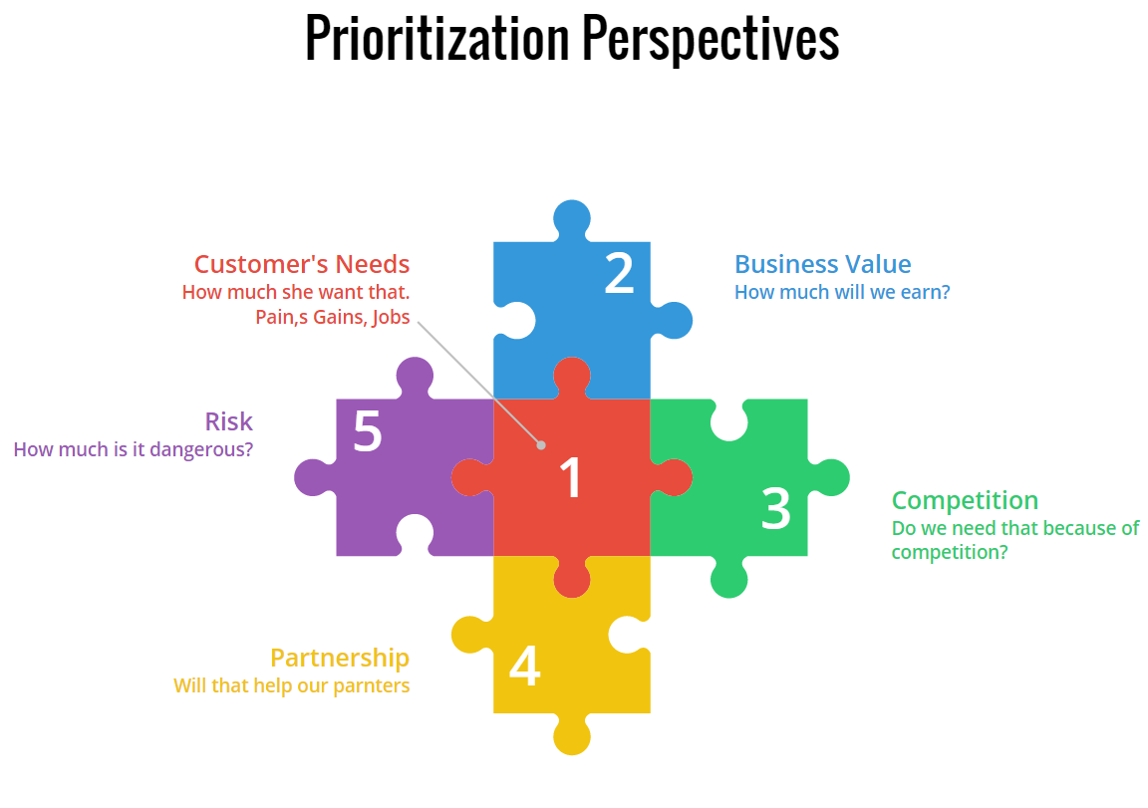
Customers’ perspective
In ScrumDesk we prefer to consider the customer’s perspective first. The idea is that a satisfied customer is a driver of further changes and success of the product itself . A satisfied customer is willing to improve the product not just by social marketing, by new ideas, but in our case even by the development of the product itself.
As the product owner, the first thing you have to understand is who your customer/user is. You need to understand and describe her space, her context, her jobs, the pains or gains she is looking for.
The best part is just coming. Based on a more than 10 years old survey done by Scot Ambler, 45% of functionalities are NEVER, NOT ONCE, used. Only 7% are used always. Plus 13% very often.
So, why develop something that customers will not use? You just spent the life of your colleagues! Common! The answer is NO! Now MoSCoW prioritization comes to help.
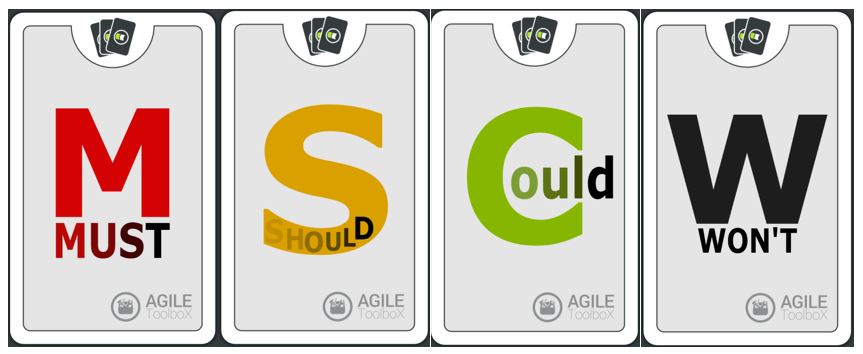
Based on that you should be able to decide if a feature is:
- Must – a heart is a “must”. Without it, there is no live organism. What is a must in your application?
- Should – a hand is “should”. Without it is hard. But you can survive even without a hand. Well, in most cases.
- Could – hair is “could”. It is fine to have them, you even look nicer, but you will definitely survive without them
- Won’t – unnecessary waste. Btw, is there anything “won’t” in a body?
How to estimate MoSCoW values in 7 steps?
- As a Product Owner, try to be in the skin of your customer. There might be multiple types of them, so choose one, or some group of them.
- If you were him, will the feature be a must, should, could, or won’t?
- Forget about the time of development, forget about effort. It is just about customer and feature.
- What if this feature was not a must, but should? Would the customer realize that?
- What if the feature was could and not should? Would the customer realize that?
- Try to make it less “must”. Remember 7% features used always.
- Compare requirements to each other. Repeat a couple of times.
Let’s say your backlog looks like this:
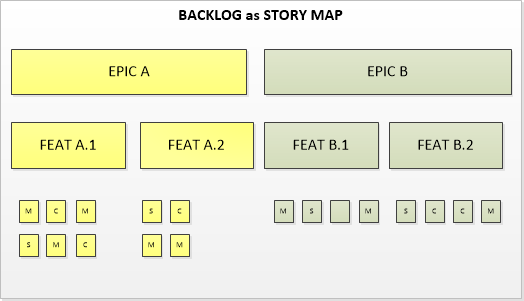
After MoSCoW prioritization you should have a line of requirements ordered by MUST, SHOULD, COULD values. This might be done in ScrumDesk PLAN view

How to manage MoSCoW in ScrumDesk ?
To set the value to backlog item you need just click it (in any view, either STORY MAP , BACKLOG , PLAN or WORK ) to access details in the side view. Prioritization fields are displayed below the title of the backlog item. The first one is MoSCoW.
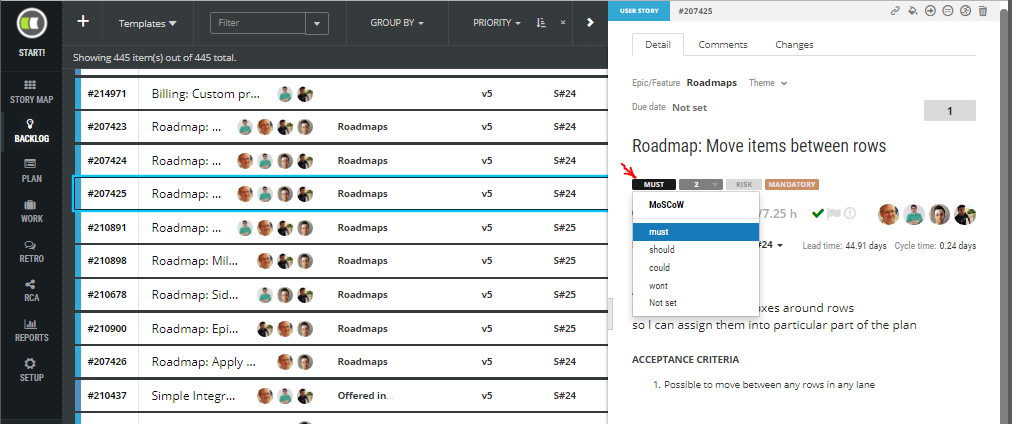
Value can be visible on cards in STORY MAP.
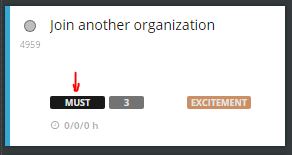
Once the value is entered, you can filter and group items based on it all ScrumDesk views, i.e. in the product backlog.
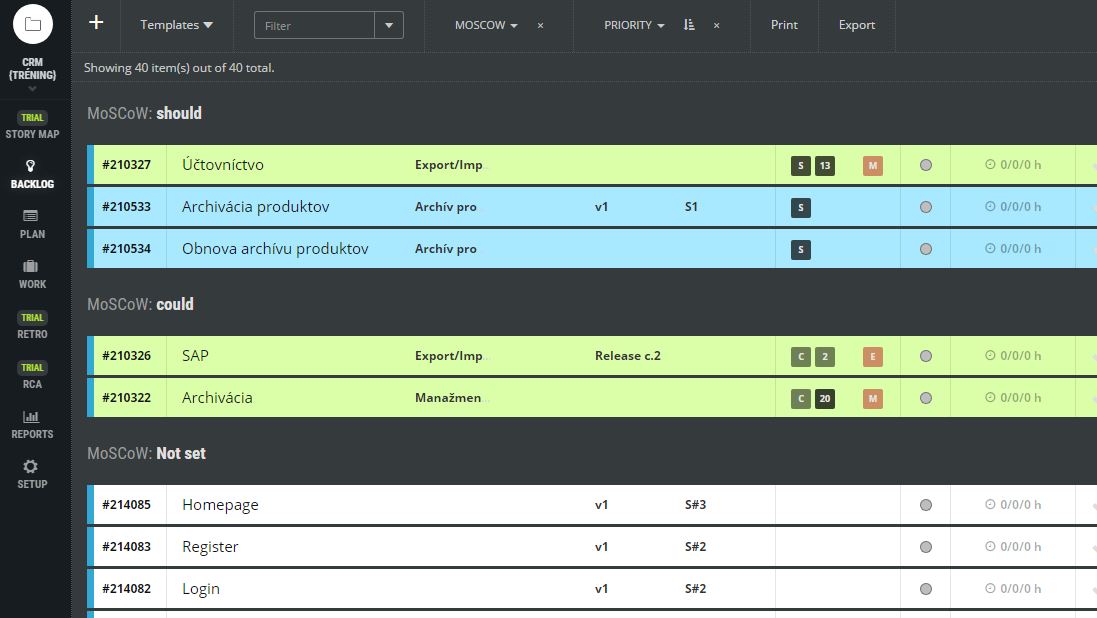
However, you are not done with prioritization in this step. What about business value? More to follow…
< Print physical cards | Content | Agile prioritization based on Business value >

COMMENTS
Peerpoint launched in the U.S. in 2021 with a small team of attorneys based in New York. We have since expanded to include legal professionals across the country. ... As you carve your own unique path, we work side-by-side with you, connecting you with outstanding interim assignments that help you grow your self-directed law career.
Peerpoint by A&O Shearman is a global platform for legal consultants and lawyers looking to access the best work and clients. ... When you need interim legal support, we'll match you with the highest caliber of consultants. ... Whether you're looking for a short-term assignment with A&O Shearman or a six-month placement with one of our ...
However, as a lawyer with Peerpoint, she now gets to work on high-end deals, as a partner-level lawyer would, but between assignments enjoys the flexibility to spend time with her family. Annemiek Wassink, earlier on in her career, leveraged the opportunities consulting offers for people looking to get acclimated to something different.
Peerpoint is seeking lawyers with a minimum of 5 years' top-tier post-qualification experience in employment law for interim assignments. Ideal candidates will have experience in general employment law advice, as well as exposure to disputes and litigation in the employment context. This role offers the opportunity to work on the best projects, clients, and resources, with the support of A&O ...
Allen & Overy is now hiring a Attorney - Peerpoint Interim Assignments - Intellectual Property - US in Washington, DC. View job listing details and apply now. Who we are and what we do Peerpoint is Allen & Overy's global platform for self-directed lawyers who want to access the best work, clients, resources and bespoke support,
Peerpoint is Allen & Overy's global platform for self-directed lawyers who want to access the best work, clients, resources and bespoke support, whilst working on assignments with Allen & Overy or directly with clients. Assignments are usually at least three to six months in duration and flexible working arrangements are available.
Who we are and what we do Peerpoint is Allen & Overy’s global platform for self-directed lawyers who want to ... See this and similar jobs on Glassdoor
Peerpoint is Allen & Overy's global platform for self-directed lawyers who want to access the best work, clients, resources and bespoke support, whilst working on assignments with Allen & Overy or directly with clients. Assignments are usually at least three to six months in duration and flexible working arrangements are available.
Description. Peerpoint by A&O Shearman . Progressive legal careers. Peerpoint is A&O Shearman's global platform for self-directed lawyers who want to access the best work, clients, resources and bespoke support, whilst undertaking assignments of typically six months or more, most often directly with clients, and occasionally within the A&O Shearman practice.
Peerpoint attorneys may take on assignments with clients or with Allen & Overy. * Benefit from the resources from an elite international law firm. * Earn generous compensation, including benefits such healthcare, access to Allen and Overy's resources and training opportunities, and reimbursement of professional fees.
The Siberian Dilemma. Journalist Tatiana Petrovna is on the move. Arkady Renko, iconic Moscow investigator and Tatiana's part-time lover, hasn't seen her since she left on assignment over a month ago. When she doesn't arrive on her scheduled train, he's positive something is wrong. No one else thinks Renko should be worried—Tatiana is ...
Peerpoint is Allen & Overy’s global platform for self-directed lawyers who want to access the best work, clien... See this and similar jobs on Glassdoor
Discuss assignments and deadlines (documentation of experience, performance evaluations, required assignments, deadlines, etc.). Register and pay for your internship credit during the semester you are performing your internship. After reviewing the internship details that you have provided, the internship credit coordinator will determine if ...
As you carve your own unique path, we work side-by-side with you, connecting you with outstanding interim assignments that help you grow your legal consultancy career. Legal consulting with Peerpoint means being part of A&O Shearman. You'll be fully supported in your law career by our highly experienced team.
MoSCoW Prioritization was originally invented by Dai Clegg of Oracle, but was subsequently donated to the Dynamic System Development Method (DSDM) Consortium. [2] MoSCoW was designed to be used with time-boxing and although it is mostly referenced in regards to requirements, as the DSDM web site makes clear it can be applied to requirements ...
To set the value to backlog item you need just click it (in any view, either STORY MAP, BACKLOG, PLAN or WORK) to access details in the side view. Prioritization fields are displayed below the title of the backlog item. The first one is MoSCoW. Value can be visible on cards in STORY MAP. Once the value is entered, you can filter and group items ...